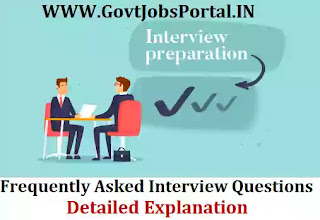How to Prepare for an Interview?
Important Interview Questions with
Detailed Explanation
Practicing
your responses to common interview questions, without learning them
parrot-fashion, is a really good way to boost your confidence and make sure you
are ready for your meeting.
You’d be surprised at how many people think
they can just turn up to an interview and be able to do well. Whatever job you
are going for, one of the keys to a successful interview performance is
preparation. Preparing for an interview can take a bit of time and effort, but
if it’s a position you genuinely want, you should look on it as a worthwhile
investment.
There are a number of areas you need to focus
on when you’re preparing for an interview. Here are some of the key things you
need to look at.
Information gathering
The
first part of you preparation is making sure you have all the details you need
about your interview. What kind of interview will it be, and what kind of
questions are you going to be facing? Do you have all the information about the
position you’ve applied for? You’ll need this to make sure the rest of your
preparation is focused on the right areas.
Do your research
Now
you need to look at doing a bit of research, to find out more about the
business and the people you are going to see. How much time you spend on it
will no doubt be decided by the type, and level of job you are going for. If
it’s the position you’ve always dreamed of, and a huge step up for your career,
there really is no such thing as too much research.
Get ready to sell yourself
When
you’ve got a better understanding of the company and people you are going to
meet, as well as the position you will be interviewed for, and the skills you
will need, it’s time to start building a compelling argument for why you’re the
best applicant for the job. To do this, there are a few key things you need to study.
You are going to need to think about why you want to work for the company
you’re meeting, and what you have to offer them over all the other candidates.
Practice
Once
you’ve gathered all the information you need, and determined what experience
you have that shows you have the necessary skills for the job, you now need to
practice your interview performance, and finalize your preparations. A friend
or family fellow can play the role of the interviewer, or just practice in
front of the mirror – it’s significant to get used to speaking about your
skills and experience.
Final preparation
You should be just about ready for your
interview now. All that’s left are the last few things one must do, to make
sure that you are fully prepared. You’ll need to dress suitably and try to get
it all prepared the night before the interview. Know where you’re going and
allow yourself plenty of time to get there – you don’t want to be late.
One of the biggest fears most people have about
job interviews is giving the wrong answer to any of the questions they get
asked – or worse still, not having an answer at all. While interview
success is about a lot more than just learning the answers to the most common
interview questions, it can help to understand the kind of questions you might
be asked, and what the interviewer is trying to find out, so you can work out
the best way to answer them.
Spending a bit of time going over your answers to some of the questions you might be asked in your interview is definitely a good idea. It’s a great way to make sure you know exactly what you want to say and will help you be more confident in your meeting.
Most candidates get a huge boost from practicing their answers to common interview questions – it makes you realize just how much you have to offer, and why they should be offering you the job. If you’re nervous, practice answering a few questions in front of the mirror. If you can get a friend or a relative to play the part of the interviewer, that’s even better. They might not know anything about the job or the company you are being interviewed for, but they will be able to give you some really useful feedback on what you say, and how you say it.
Here are some of the most frequently and
common interview questions, as well as a better explanation of each of them, to
help you come up with the right answer for your particular situation.
1.
What’s your greatest strength?
Most people aren’t too keen on self-promotion,
so this is an opportunity for the interviewer to see how comfortable you are
answering the question, and how well you express yourself – so make sure you
answer the question confidently, and you have a good example of when you
demonstrated this strength, in case they ask for one. Try and focus on one of
your strengths that is relevant to the position you’ve applied for.
2.
What’s your biggest weakness?
Interviewers ask this question, to, first of all, see how you react, and then what kind of answer you give. The best way to
answer is often to highlight a weakness that you’ve identified and have
corrected, or are in the process of improving. Nobody’s perfect, so talking
about areas where you need development shouldn’t worry you, as long as it’s
something you are aware of, and doing something about.
3.
Why do you want this job?
This is going to tell the interviewer about
your motivation for applying for the position, as well as how much you’ve
thought about the job you’ll be doing. Try to focus on reasons which are
specific to the job you’ll be doing, and the company you’ll be working for.
Whatever your motivation, you need to show the interviewer that you have a
genuine interest in the position.
4.
Why should we hire you?
This is really two questions wrapped up in one.
Firstly, the interviewer is asking why you think you’re right for this position
– so you need to highlight the specific skills that would benefit the company.
Secondly, they’re asking what you feel you might offer over any of the other
candidates. Focus on your individual skills, and any experience that might be unique.
5.
What 3 words would your boss/colleagues use
to describe you?
This is another way of asking what soft skills
you think you have that make you the best candidate for this job, as well as
telling the interviewer a little bit about what you’d be like to work with. Be
genuine and think about what your boss/colleagues might say, but always try to
make it skills and characteristics that will be of benefit to your new
employer.
6.
Tell me about the last time you were
unsuccessful in your job and how you dealt with it?
Interviewers appreciate that nobody is perfect.
They’re less bothered about the specific reason you were unsuccessful and more
interested in how you dealt with the failure, what you’ve learned from it, and
what you did better/differently next time. Choose an example that you have
indeed learned from, and have an example of when the same situation came up
again and you applied what you’d learned, this time you were successful.
Once you have a better understanding of the
questions an interviewer is likely to ask, and what information they’re looking
for, you should be in a much better position to tell them what they want to
hear. Insider Secrets to Interview Success looks at these and a number of other
interview questions in more detail, as well as providing all the training and
advice you need to make sure you have the right answer, every time.

![LinkedIn Career Explorer Tool [Tips to Use | Limitation and How to Use] LinkedIn Career Explorer Tool [Tips to Use | Limitation and How to Use]](https://blogger.googleusercontent.com/img/b/R29vZ2xl/AVvXsEgprGHQQp7uJweIGJ3C32sp3ecaam5dY_MPNmvGbhhtQM2-MGPomrFZgwLSw1f4GxjeWxzgAyXvlqzcii0z0tzimxke6SbEjwmKjO4JzNfQsybYSxW0DdnnNgOSTdCGVU9z9OOwLuu41oCtWBC1IR3Rq4wQafUOz0D6mb4WNaNtQX74mFG9ORYq57Ux9A/w320-h206/LinkedIn%20Career%20Explorer%20Tool.webp)






